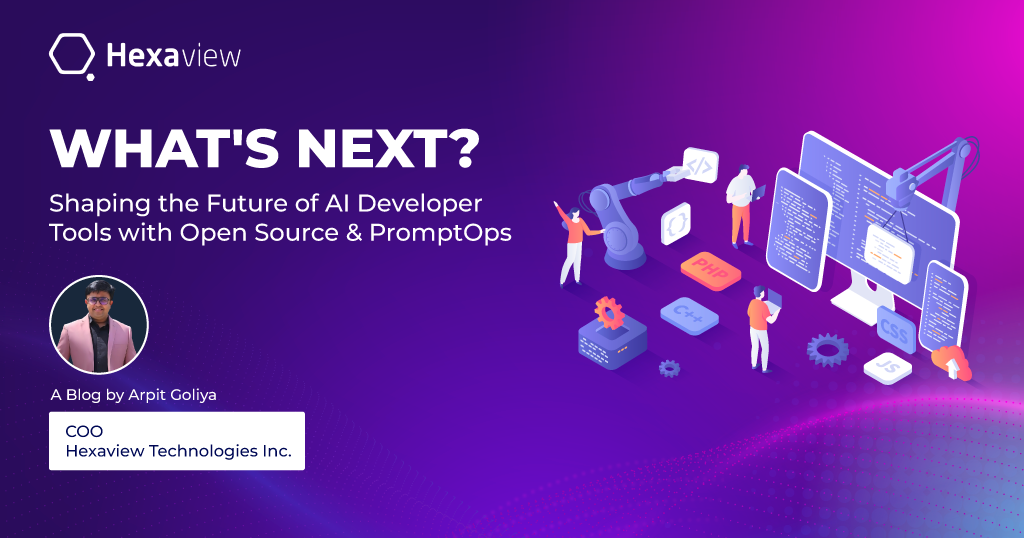General Published on: Mon Sep 15 2025



Imagine if you’re a developer who is sitting to write code now and the AI assistant suggests snippets, flags the errors before they actually happen and even generates test cases within minutes. All of it without a single line of manual boilerplate. Just a few years ago, such a workflow might have sounded like a far future or unimaginable. However, it is now becoming the norm. Artificial intelligence is no longer a bonus feature in coding, but it is actively reshaping the way software is used to be written, debugged and deployed.
The rapid transformation can be attributed to the fusion of AI and the open-source ecosystem. Open source majorly thrived on accessibility and collaboration, and adding AI layers to it has helped developer tools evolve faster. From GitHub to other coding agents, teams are able to rethink their traditional development cycles by the integration of AI models directly into CI/CD pipelines, IDEs and system monitoring dashboards.
The shift equally comes with a new discipline of PromptOps. As prompts are becoming the new interface between AI-driven tools and developer tools, optimizing, managing and operationalizing them is becoming a more critical skill. PromptOps is not just simply about asking AI for help, but it is about structuring, governing and refining interactions at scale. This ensures security, consistency and reliability in the engineering workflow. It is the future of coding operations that is already taking shape in recent times.
Evolution of AI Developer Tools
Even a few days back, developer tools were limited to manual debugging, static IDE and code compliance. While such environments provided structure, there was an immense burden of optimization, logic and error detection on the developers. Debugging was not less than a painstaking process that needed hours of stepping through code line-by-line when productivity relied completely on individual experience and skills.
Now, the landscape has already transformed. AI-driven coding assistance like TabNine, GitHub Copilot and ChatGPT-based tools are able to auto-complete functions, generate complex algorithms with natural language prompts and explain legacy code. Apart from mere assistance, these autonomous coding agents have been emerging to take on tasks like testing, refactoring and deployment without the need for human intervention. The shift reduces friction in the development process, helps developers to focus more on creative problem-solving instead of repetitive tasks and accelerates the delivery timeline.
The primary driver of this evolution can be attributed to open-source collaboration. Open-source communities are not just integrating AI into frameworks, but they are also constantly pushing innovation at a speed that proprietary tools might not be able to match. Transparency ensures developers can find how models have been trained, contribute constant improvement to back the ecosystem and adapt tools according to their unique workflows. Additionally, the adaptability of open-source solutions can be beneficial for organizations to customize AI-powered developer tools that align with compliance, security and scalability requirements.
Altogether, AI with open source can define what it means to write code and shift the role of developers from manual execution into collaborative and intelligent systems.
PromptOps as a Discipline
PromptOps can be defined as the emerging discipline that focuses on AI models, operational management of prompts and workflows it enables. Just like DevOps created structure and efficiency in the software delivery pipeline, PromptOps offer a systematic way to handle the increasing reliance on AI-driven development. It is no longer just about writing prompts, but it is about governing them, testing them, versioning them and making sure that they are able to constantly deliver reliable outcomes across different projects and teams. The creation of an operational layer in AI integration with PromptOps ensures developer workflow is powered through generative AI to remain trustworthy, scalable and aligned with organizational goals.
Why is PromptOps Important?
- It ensures reliability – It is crucial to know that prompts can behave differently based on context, phrasing and model of updates. PromptOps clearly introduces a framework for validating, testing and constantly monitoring prompts to make sure that they constantly return with accurate and high-quality output. It reduces unpredictability and aims to improve developers' trust in AI-driven tools.
- Improves fairness and reduces bias – There are chances that AI models might unintentionally reinforce bias within codes or recommendations. PromptOps can handle this as it incorporates systematic evaluation, guardrails for minimizing harmful outputs and feedback loops to make AI assistant development more inclusive and secure.
- Effectively manages version – Similar to code repositories tracking changes, PromptOps can manage workflow versions and prompts. Therefore, allow teams to easily get back to previous iterations, track the development of AI-driven solutions and compare performance to ensure stability in production environments.
- Improve collaboration across teams – PromptOps provides multiple developers, operations teams and data scientists to seamlessly work by creating documentation and shared prompt libraries. If, therefore, standardize and reduce effort duplication.
- Optimize performance and cost – While AI models can consume significant resources, PromptOps makes sure that every prompt is efficient, which reduces unnecessary API calls and optimizes runtime performance for cost-effectiveness and ability.
In several ways, PromptOps feel similar to the rise of DevOps. Just the way DevOps has transformed software delivery into a collaborative, reliable and continuous process, PromptOps is doing a similar thing for AI-driven development. This will make interactions with models more predictable, enterprise-ready and scalable.
How is the future powered by open-source AI tools?
When it is about innovation, open-source tools have always been the catalyst. However, in the area of AI-driven development, it has an even more profound impact. By combining community-driven collaboration with transparency, the open-source ecosystem has been accelerating the evolution and adoption of AI developer tools.
Major benefits
- Technology democratization – Open-source projects are able to make use of advanced AI capabilities as they are accessible to start-ups and individuals. These would otherwise have been unaffordable with proprietary solutions. This level in the playing field encourages diversity in innovation.
- Ensure rapid innovation – Projects are constantly evolving at a pace that the ecosystem will not be able to match, even with thousands of contributors across the world. Bugs are fixed later, experimentation thrives every day, and new features are constantly added.
- Ensures efficiency – As it reduces reliance on expensive licenses, enterprises can scale AI solutions or create prototypes at much lower cost. However, it still retains the flexibility to customize them for unique use cases.
- Interoperability – Open-source frameworks have been designed to integrate seamlessly with a wide range of tools, platforms and API. The flexibility ensures organizations can build an ecosystem without vendor login.
LangChain provides a modular building block for AI application development. It allows enterprises to deploy conversational agents and prototype rapidly.
Hugging Face is a community hub for pre-trained databases and models. It creates and encourages collaboration and acceleration in research to production workflows.
Enterprises are now able to leverage the power of open source responsibly by evading security frameworks and governance in their adoption strategies. Hence, scanning dependencies for vulnerabilities, creating internal review policies and contributing to project sustainability can be made by AI usage.
Why is Hexaview Technologies investing in AI engineering services?
At Hexaview Technologies, we plan for the future. From this point, we can clearly visualize the inflection point on the way enterprises build and scale technologies. No longer is AI an experimental add-on, but it is slowly taking the foundational stage for modern software engineering. Even then, several organizations are struggling to bridge the gap between enterprise-grade requirements and rapidly evolving AI tools like compliance, ability and security. This is exactly where the AI engineering services come into play.
Bridges the gap between AI tours and Enterprises
Our experts wish to become the connector between enterprise requirements and cutting-edge AI innovation. By combining a strong understanding of organizational objectives and priorities with deep engineering expertise, we aim to help companies adopt AI to achieve not just for experimenting but equally for long-term business transformation.
Future proofing with hybrid AI
Enterprise succeeds by choosing “all-proprietary” or “all open source”. We can therefore help organizations create a customized blend of both. We have to leverage the flexibility of open-source tools while embedding proprietary solutions to ensure compliance, long-term maintainability and security. The hybrid approach will ensure businesses remain adaptive to the fast-changing ecosystem.
Creating trust at scale
Our ultimate focus is on building trust. From governance and compliance to measurable ROI, our experts are able to design AI engineering solutions that are reliable and transformative. We help enterprises move beyond experimenting with scale adoption to ensure not just keeping up with evolution but leading it.
The Road Ahead
The future of developer tools easily points towards an autonomous debugging system, smarter IDEs, and AI-first workflows, as these are the scenarios where prompts are equally important as code. Open source will keep driving interoperability and rapid innovation, while PromptOps can provide structure to make AI adoption capable, enterprise-ready and reliable. The future of software development clearly lies in collaborative innovation where communities, enterprises and developers can co-create intelligent, adaptive and trusted engineering ecosystems.
Conclusion
Hexaview Technologies is thoroughly committed to shaping a future that combines engineering expertise with enterprise great capability and trust. From PromptOps frameworks to IDE integrations and custom element adoption, we aim to help organizations unlock the complete potential of AI-driven development. The transformation is happening, and you must act now to stay ahead.
Follow, subscribe and contact us for AI enterprise builds.

Arpit Goliya
What's Next?
Shaping the Future of AI Developer Tools with Open Source & PromptOps
















